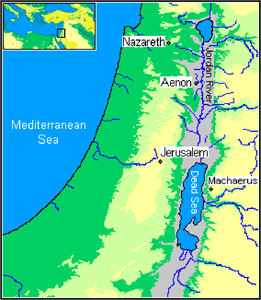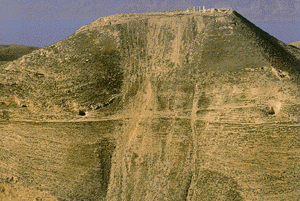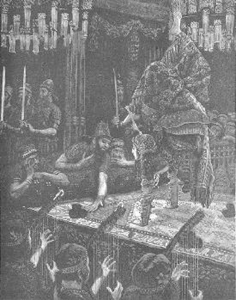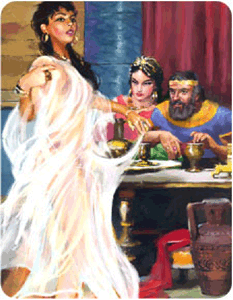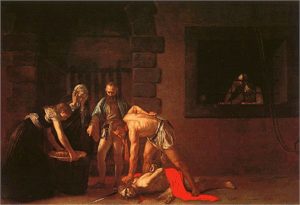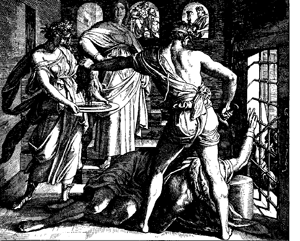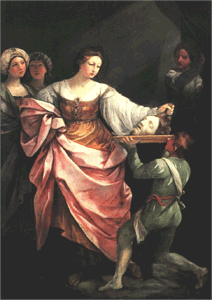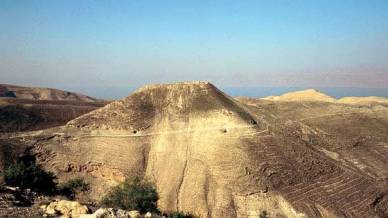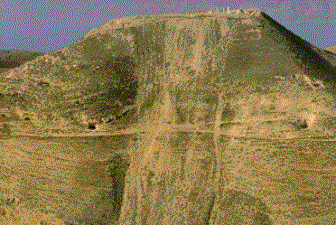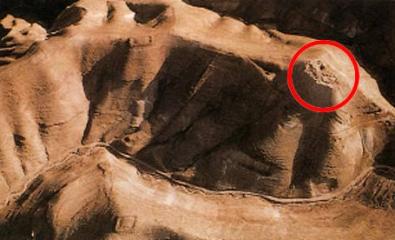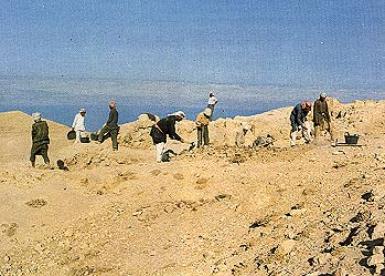
Christmas
Easter
Pentcoest
All Saints
Christ The King
Confirmation
Palm/Passion
Reformation
Stewardship
Books of the Bible
Lenten Series
Christmas Dramas
Videos
Series A - Matthew
Series B - Mark
Series C - Luke
Series D - Other
To contact
Edward F. Markquart
info@sfs.com

Series B Mark 6:14-29 The following Bible study is from a larger course entitled, THE LIFE OF CHRIST: A Study in the Four Gospels. This 54 week course for the laity will be available for congregations in 2006. Basic text for the course: SYNOPSIS OF THE FOUR GOSPELS, Kurt Aland, English Edition, P.133. The Larger Context In today’s study, we will closely examine the Scriptures about John the Baptist. We will also closely examine the writings of Josephus about the Baptist. Josephus was a Jewish historian who lived immediately after the time of Christ (37-100 CE). He offers us a “secular,” “non-Biblical view” of John the Baptist. He was a historian and advisor to three Roman emperors and his books were widely read for centuries. He was sympathetic to John the Baptist, perhaps because Josephus himself spent three years as a youth, from age sixteen to nineteen, living a life of an ascetic in the desert. The New Testament story of John the Baptist is the only New Testament story that can be examined through first century, secular history in order to gain further information and insights. The story of John the Baptist is found in both the New Testament and the secular history of that time. We will first study the Scriptures about John and then we will study the writings of Josephus. We will discover that the historical accounts about John in the gospels and the historical accounts of John in Josephus reinforce and supplement each other. http://www.lifeofchrist.com/history/maps/johnmap.asp John the Baptist MapFind Machaerus on the map below. This map shows where John the Baptist lived and ministered. Notice the location of the Dead Sea and remember that the Dead Sea Scrolls were found buried in the cliffs overlooking the Dead Sea. Nearby the caves in which the Dead Sea Scrolls were found was the ancient fortress of Machaerus. Machaerus was the name of the fortress where John the Baptist was beheaded.
We need to see the site of the castle in which John the Baptist was imprisoned. The fortress of Machaerus was located on the top of this tall hill and had a panoramic view of the Dead Sea and Palestine. Of course, as with nearly all other archeological sites, Machaerus would have worn down through the centuries and been covered with layers of dirt and debris. The first archeological investigations of the site began in 1968.
#143 Opinions Regarding Jesus Matthew 14:1-2, Mark 6:14-16, Luke 9:7-9 The three gospels are parallel. This is not Q. The basic story comes initially from the Gospel of Mark. The Gospel of Mark is Simon Peter’s eye-witness account of Jesus’ life. The Gospel of Mark is filled with luscious, spicy details that enhance the story. So it is with Peter’s recollection of the following incident about John the Baptist. Peter would have not witnessed the beheading of John the Baptist since Peter was not at Macherus (the prison), but this story was part of Jesus’ and Peter’s life. -King Herod heard of it, for Jesus' name had become known. The Gospel of Mark calls Herod a king but the Gospel of Luke calls him a tetrarch. When Herod the Great died in the year 4 BCE, he divided his kingdom among his sons. Herod the Tetrarch was one of those sons. Tetrarch means four or the ruler of one of the four parts. He was also known as Herod Antipas. He ruled Galilee and Peraea. We learn about this Herod Antipas from the Bible but also from Josephus in his book, THE ANTIQUITY OF THE JEWS. This King Herod, the Tetrarch, ruled for forty years. Herod’s name evoked fear among the Jews. Herod the Great was a brutal man and had killed babies at Jesus’ birth. Now his son would about to behead John the Baptist. King Herod heard of “it.” What is “it?” The successful mission of the twelve disciples who had gone out two by two, preached the gospel, and healed the sick. The “it” is the fame of Jesus who had become well known. The previous verses in Mark 6 are about the commissioning of the twelve disciples and sending them out two by two. The disciples were successful in their mission. The question was: “Who is this Jesus, whose movement is starting to sweep the land?” Some said, “John the Baptist raised from the dead.” -Some were saying, "John the baptizer has been raised from the dead; and for this reason these powers are at work in him." These words tell us that John the Baptist had already been killed. Jesus was thought to be the reincarnation of John the Baptist and this accounted for the powers that were working through him. That was the rumor floating around the land. -But others said, "It is Elijah." Jesus was thought to be Elijah re-incarnated. -And others said, "It is a prophet, like one of the prophets of old." Yes, Jesus was thought to be one of the mighty prophets from the Old Testament years. -But when Herod heard of it, he said, "John, whom I beheaded, has been raised." Herod was convinced that Jesus was none other than John the Baptist whom Herod had beheaded. Of the choices available to him, Herod thought that Jesus was not a re-incarnated Elijah nor another prophet of the Old Testament. Herod was convinced that Jesus was none other than John the Baptist raised from the dead. In other words, it appears that Herod was feeling guilty about his execution of John the Baptist and that the Baptist was coming back to haunt him in the person of Jesus. The event of John’s beheading is recorded both in our gospels and in THE ANTIQUTIES by Josephus. Origin, one of the great early church fathers, when studying this text, said that Jesus and John the Baptist were cousins and therefore, perhaps looked alike. Simply, Herod believed that Jesus was none other than John the Baptist who was raised from the dead. John the Baptist had come back to trouble Herod. -For Herod himself had sent men who arrested John, bound him, and put him in prison on account of Herodias, his brother Philip's wife, because Herod had married her.In other words, we hear that Herod had illicitly married his brother’s wife. That marriage was morally wrong. John criticized Herod for this sinful action. We hear a similar story from Josephus. A prophet is one who speaks those in power. A prophet usually gets into trouble for criticizing the governing authorities. Those governing authorities often imprison or kill that prophet in order to silence him. Then the prophet becomes a martyr, one who dies for the faith. A prophet is a truth-teller and often governing authorities don’t like a truth-teller telling the truth about them. The prophet is a whistle-blower and John the Baptist blew the whistle about Herod’s marriage to Heriodius. The prophet shouted, “Foul.” Herod and Herodius preferred that John the Baptist would have kept his mouth shut, so the two of them could continue their lives in wedded bliss. -For John had been telling Herod, "It is not lawful for you to have your brother's wife." John did not mince words. He called a spade a spade. Prophets always do. Martyrs always do. It appears that John spoke directly to Herod. We do not know how John came to be in the presence of Herod, but the text suggests that John spoke directly to Herod. One of the purposes of the prophets is to speak the Word of the Lord to the governing authorities. The prophet Nathan had spoken similar condemning words to King David about Bathsheba. John the Baptist told the truth to Herod that he had illicitly married his brother’s wife. Herod did not like that John was so bold and brash with the truth. Throughout the centuries, prophets have been truth-tellers to their kings. In more recent times, we remember Robert Bolt’s play, A MAN FOR ALL SEASONS, and the story of Sir Thomas More confronting the king about his impending divorce. Sir Thomas More was executed for speaking out against the king’s moral choices. I remember seeing that play at the end of the Viet Nam War, and the audience erupted with a standing ovation. It was a standing ovation like I had never seen before. Sir Thomas More was presented as a figure who stood by his convictions and criticisms of the king. There are times in history when people need to stand by their convictions and against the moral choices of the political leadership of the day. Sir Thomas More became a symbol of the anti-war movement during the Viet Nam era. He was a man who stood up against an immoral choice by the king … and paid the price for it with his neck. -And Herodias had a grudge against him, and wanted to kill him. But she could not,. The motive for the evil deed was to be found within the heart Herodias. Herodius was vindictive. She, too, must have heard the piercing criticisms by John the Baptist about her marriage to Herod, and she was simmering inside with rage against the Baptist. -for Herod feared John, knowing that he was a righteous and holy man, and he protected him. Herod respected John, knowing that the Baptist was a righteous and holy man. Herodius could not have John executed because Herod was mesmerized by the integrity and moral righteousness of John and held him in high esteem. We recall that Simon Peter, the original story teller, thought that John the Baptist was a righteous and holy man. In what way did Herod protect John? Maybe from the wrath of Herodius as long as he could? -When he heard him, he was greatly perplexed; and yet he liked to listen to him. In other words, it seems that Herod found John and John’s message intriguing. It seems that Herod was positive and receptive to John’s words and wisdom. Simon Peter via the Gospel of Mark tells us that Herold like to listen to the Baptist. -But an opportunity came when Herod on his birthday gave a banquet for his courtiers and officers and for the leaders of Galilee. Readers from all centuries can imagine the scene. Simon Peter via John Mark (the Gospel of Mark) gives us so many colorful details. It seems that Herodius was looking for an opportunity to “get” John. -When his daughter Herodias (named Salome according to Josephus.) When I asked my Bible class (who were attending this course in the gospels) if anyone knew the name of Herodias’ daughter, several members volunteered her name. Salome! Yet the name of Salome is not mentioned in the Biblical text. People knew the name of Salome, Herodias’ daughter. Why? Because Josephus’ naming of Salome had become part of our folk knowledge of this New Testament story. This was a step-daughter from Herodius’ previous marriage, not a biological daughter from a union between Herod and Herodius. -came in and danced, she pleased Herod and his guests; and the king said to the girl, "Ask me for whatever you wish, and I will give it." Students of the Old Testament think of the parallels of this story to Ester and her dancing before the king who also promised to give her half of the kingdom.
In our modern minds, we sometimes think that she dance a seductive dance, even though the text does not say that. See the painting below.
-And he solemnly swore to her, "Whatever you ask me, I will give you, even half of my kingdom." Obviously, Herod was “taken” with the young woman. What a foolish and impetuous comment, revealing the character of Herod and the Herod family before him. Or perhaps Herod was playfully exaggerating with the young girl when he made his promise. It is difficult to think that Herod was actually offering half his kingdom in appreciation for a dance. His words have an air of being puffed up bravado in front of his friends and perhaps were not to be taken literally. -She went out and said to her mother, "What should I ask for?" She replied, "The head of John the baptizer." In other words, we learn the truth. That is, Herodias was the one who wanted the head of John the Baptist. Here was the opportunity to Herodius was looking for. She would shame Herod in front of his friends into killing John the Baptist. Shame works most effectively when friends are present in the room. -Immediately she rushed back to the king and requested, "I want you to give me at once the head of John the Baptist on a platter." The young girl rushed back into the banquet and asked for the head of the Baptist…on a platter, mind you. A platter used in the banquet. -The king was deeply grieved; yet out of regard for his oaths and for the guests, he did not want to refuse her. Herod had fallen in to the trap. Herod “had to” honor his bravado and grant the young woman her request. But all along, he knew it was a bad choice. Herod didn’t want to be humiliated in front of his guests. Herod was stuck between his bravado and his oath to give his step-daughter what she wanted. Herod’s vanity before his friends was more important to him than doing what was right e.g. leaving John the Baptist alone. -Immediately the king sent a soldier of the guard with orders to bring John's head. He went and beheaded him in the prison, The brutality of this scene has motivated artists through the centuries to capture the moment on canvas. Violence always has seemed to sell and appeal to the public’s sense of macabre. http://cgfa.sunsite.dk/caravagg/p-carava35.htm
http://www.wels.net/wmc/Downloads/187.gif
brought his head on a platter, and gave it to the girl. Then the girl gave it to her mother. http://www.wga.hu/art/r/reni/2/salome.jpg
-When his disciples heard about it, they came and took his body, and laid it in a tomb. John the Baptist’s disciples were around in the vicinity and heard about their master’s death. Perhaps they were camped outside the walls of the fortress of Machaerus, waiting to hear about their master and his fate. When they heard the dreadful new of the Baptist’s execution, they came and asked for his body and buried it. Without saying so, Peter knew the disciples’ deep grief over the loss of their master. -Now when Jesus heard this, he withdrew from them in a boat to a lonely place apart. Matthew 14:13.A reader gets the feeling that Jesus withdrew from to a lonely place to grieve the loss of this great prophet who was the first genuine prophet in four hundred years, this prophet had had baptized him, this prophet who was the forerunner of the Messiah. A question is asked, “Why did Mark include this story of the beheading of John the Baptist here in his narrative of Jesus’ life?” We are not sure. It seems that Peter (and therefore John Mark) connected the story about the beheading of the Baptist with the previous story in Mark 6 about Jesus being rejected in his own hometown synagogue and his teaching that a "prophet is not accepted in his own hometown." Jesus was run out of town; the Baptist was thrown into prison. Jesus was eventually executed by the Roman authorities; the Baptist was executed by the Romans. The story of the beheading of the prophet John the Baptist fits well into the sequence of Jesus' teaching about the unacceptability of prophets. We know that the story of Jesus’ life as told by Simon Peter to John Mark is an eyewitness account. Following the Gospel of Mark, we know this tragedy may have occurred while the disciple were out of their “two by two” mission. As reported in the Gospel of Mark, Jesus was rejected during his visit to the synagogue in his hometown of Nazareth and then sent out the twelve disciples on their first missionary journey. While on that missionary journey, it seems that John the Baptist was executed. That is why the Gospel of Mark has included this story at this point in the narrative. It was historically accurate to do so. Luke moves this story up to the earliest section about the baptism of Jesus by John the Baptist. Luke minimizes the story and omits its gory detail. Luke is not an eyewitness account. Matthew consistently follows Mark and places this story immediately after the telling of Jesus’ parables and before Jesus’ feeding of the 5,000. For Matthew, it is a transition story. Matthew is not an eyewitness account. Mark reports the story of John’s beheading into the larger narrative, after the first twelve disciples who were sent out two by two and before the apostles returned from their first mission trip. For John Mark and his retelling of Peter’s memory of Jesus, this event of the beheading of the Baptist perhaps occurred while the disciples were out on their first missionary journey. This story is a powerful story and stands alone. Rather than looking at the context to help discover the meaning of this story, it is important to examine the story itself. What is the message? John the Baptist, who a prophet of God, the forerunner of the Messiah, and the baptizer of Jesus, was beheaded by a King Herod for telling the truth to Herod about his illicit marriage to Herodius. Prophets of God have forever been martyred for their spiritual integrity and being truth-tellers to those in political authority. The Messiah himself was to be martyred on the cross. Many of the first twelve disciples would become martyrs. Eventually, it was said that “the blood of the martyrs is the seed of the church” (Tertullian). The blood of martyrs energized the growth of the church. Martyrs become symbols. Martyrs are symbols of deep commitment to Jesus Christ, and to the truth and values of the gospel. Martyrs inspire us, lift us up, energize us, to have the same quality of commitment to Christ and his values that the martyrs had. We will meet this same Herod later in the Jesus Story, when Jesus appeared before Herod on that Good Friday morning.
_______________________________________________________________________ FURTHER EDUCATIONAL RESOURCES ABOUT JOHN THE BAPTIST AND JOSEPHUS
QUOTATIONS FROM JOSEPHUS ABOUT JOHN THE BAPTIST Some Jews thought “the destruction of Herod’s army came from God and was a very just punishment for what he did against John called the Baptist (the dipper).” Josephus. “Herodias was married to Herod, the son of Herod the Great by Mariamme the daughter of Simon the high priest. They had a daughter Salome, after whose birth Herodias, taking it into her head to flout the way of our fathers, married Herod the Tetrarch, her husband's brother by the same father, who was tetrarch of Galilee; to do this she parted from a living husband.” (Josephus) “About this time Aretas, the king of Petra, and Herod the Tetrarch had a quarrel on account of the following. Herod the tetrarch had married the daughter of Aretas and had lived with her a great while; but once when he was on his way to Rome he lodged with his half-brother, also named Herod but who had a different mother, the high priest Simon's daughter. There he fell in love with Herodias, this latter Herod's wife, who was the daughter of their brother Aristobulus and the sister of Agrippa the Great.” (Josephus) “When I was about sixteen years old I had a mind to make a trial of the several sects that were among us. There are three of these, that of the Pharisees, the Sadducees, and the third that of the Essenes, as we have frequently told you. I thought that being acquainted with them all I could choose the best.” (Josephus) _________________________________________________________________ REOURCES ABOUT THE FORTRESS MACHAERUS http://www.atlastours.net/jordan/machaerus.html Atlas Tours Net
http://www.geocities.com/Jordan_jubilee2000/Machaerus.html “An enormous castle that overlooks a mesmerizing view over the Dead Sea. It also overlooks two castles that Herod built on Elpharidis mountain (south of Bethlehem ) and on Alexandrium mountain ( North of Jericho ). You can also see the towers of the Holy City from there. In the year 90 B.C., Alexander Janius built this castle as a strong fortress against the attacks of the Nabatean attacks, until it was conquered by the Romans in the year 57 B.C.
King Herod rebuilt it as a place for relaxation and leisure, and within its same walls hold the famous story of John the Baptist’s imprisonment and martyrdom, on account of Herodias, the wife of Herod Antipas’ brother Philip, for John had said to Herod “it is not lawful for you to have her while your brother is still living”. Although he wanted to kill him but he feared the people for they regarded John as a prophet. But at a birthday celebration for Herod, the daughter of Herodias, Salome performed a dance before the guests and delighted Herod so much that he swore to give her whatever she might ask for. Prompted by her mother, she said:” Give me on a platter the head of John the Baptist”. He ordered that it be given and John was beheaded and brought in on a platter and given to the girl, who took it to her mother. Machaerus became a fortress for the revolutionary Jews until the time of Titus, and after the Romans recaptured Jerusalem and destroyed it in the year 70, and destroyed Machaerus castle in the year 71.”
http://198.62.75.1/www1/ofm/fai/FAImachr.html Franciscan Archeological Institute The name of the fortress, has been preserved by Mukawer, the name given by the Arab Banu Hamideh to the Roman-Byzantine ruins of the village existing in front of the fortress to the north.
Excavating the fortress
_______________________________________________________________________
RESOURCES ABOUT JOSEPHUS AND JOHN THE BAPTIST http://members.aol.com/FLJOSEPHUS/JohnTBaptist.htmby G. J. Goldberg
Quotations from Josephus about John the Baptist A Baptism of Purification Antiquities 18.5.2 116-119 Now some of the Jews thought that the destruction of Herod's army came from God, and was a very just punishment for what he did against John called the baptist [the dipper]. For Herod had him killed, although he was a good man and had urged the Jews to exert themselves to virtue, both as to justice toward one another and reverence towards God, and having done so join together in washing. For immersion in water, it was clear to him, could not be used for the forgiveness of sins, but as a sanctification of the body, and only if the soul was already thoroughly purified by right actions. And when others massed about him, for they were very greatly moved by his words, Herod, who feared that such strong influence over the people might carry to a revolt -- for they seemed ready to do any thing he should advise -- believed it much better to move now than later have it raise a rebellion and engage him in actions he would regret. Herodias and Salome Antiquities 18.5.3 136 Herodias was married to Herod, the son of Herod the Great by Mariamme the daughter of Simon the high priest. They had a daughter Salome, after whose birth Herodias, taking it into her head to flout the way of our fathers, married Herod the Tetrarch, her husband's brother by the same father, who was tetrarch of Galilee; to do this she parted from a living husband. Herod and Herodias and Herod's First Wife and Aretas Antiquities 18.5.1 109-115 About this time Aretas, the king of Petra, and Herod the Tetrarch had a quarrel on account of the following. Herod the tetrarch had married the daughter of Aretas and had lived with her a great while; but once when he was on his way to Rome he lodged with his half-brother, also named Herod but who had a different mother, the high priest Simon's daughter. There he fell in love with Herodias, this latter Herod's wife, who was the daughter of their brother Aristobulus and the sister of Agrippa the Great. Josephus in the Desert Life 2 Comments by Professor G. J. Goldberg The Popularity of John the BaptistBoth the New Testament and Josephus depict John the Baptist has having a more powerful influence on the majority of the people of the time than did Jesus. Josephus' description of John is more detailed than his account of Jesus, and John's death is, in the people's view, avenged afterward by Heaven with real actions, but Josephus mentions no such divine support for Jesus. In contrast with his usual attitude toward popular leaders, Josephus is sympathetic towards John the Baptist. One wonders what the difference is between John and the men whom Josephus disparages as "deceivers" (apateônes) and "enchanters" (goêtes), such as Theudas and the Egyptian. It isn't simply that John did not represent a direct threat to Rome -- Josephus always stresses the folly of those who do oppose Rome -- as many of the others also seemed apolitical. All of these, including John, seemed to be killed solely because they had a large following, which in itself was seen as a threat to those in power: there was room for only one crowd and only one leader. We are left to conclude that Josephus himself was touched favorably by the philosophy of John, just as many of his countrymen were. While he was probably working from a source that was itself positive toward John, his choice of that source would have reflected his own attitude. A Baptism of RepentanceJosephus seems genuinely intrigued by the notion of baptism and tries to explain it in terms his audience can understand. (The word derives from the Greek baptô, "dip".) He understands it first as a purification of the body, playing the same role as the traditional mikvah. The spiritual question involved is whether John has the power to forgive sins, perhaps with the aid of water that has mystical properties. Josephus strongly denies that John claimed any such power: the washing was a physical manifestation of a spiritual commitment to performing good works. In the New Testament John gives a "baptism of repentance," and insists angrily to those who come to him that they must "bear fruits worthy of repentance," an attitude which accords with Josephus' description. But he is also seen as providing "forgiveness of sins" after the repentance has been made, and the religious authorities, particularly in the Book of John, are suspicious that he is taking upon himself a divine role. His follower Jesus is more directly accused of this in the other Gospels. Josephus does not hint that John was announcing the imminent coming of the Messiah, as the New Testament does. But throughout his works Josephus deliberately hides references to the Messiah (for example, in his account of Moses he leaves out Deuteronomy 18) -- except to describe the notion as a primary cause of the war with Rome, which was evidently well known to his non-Jewish audience (the Roman historian Tacitus also mentions it), which is reason enough for him to not want to provoke his audience by presenting the idea positively. Yet it is difficult to understand the excitement of the people in response to John simply based on the description of his philosophy as given by Josephus. EssenesModern scholars see a similarity between John and the sect that wrote the Dead Sea Scrolls, who are usually taken to be the Essenes described by Josephus. John may have once been an Essene who developed a following of his own. This may explain Josephus' favorable view of John, for the Essenes are described in very much greater detail than the other two major Jewish philosophies. Moreover, in his autobiography, Josephus tells us that when he was a teenager he spent three years in the desert with a man named Banus who resembles John in behavior (as in Mark's description). This Banus clothed himself using only trees, ate only food that was found in the wild, and bathed himself in cold water several times a day. Yet this Banus was not an Essene, but a unique individual. This experience seems to have given Josephus a lasting sympathy for people who led this way of life, which is quite probably why he speaks so favorably of John the Baptist. Herod's Marriage to HerodiasThe gospel of Mark states that John criticized the marriage of Herod the Tetrarch to Herodias, and it was this criticism that led to John's arrest and execution by Herod. Josephus does not say that the marriage had anything to do with Herod's action. But there is an implied connection between the two -- this is found in Josephus' account of the destruction of Herod's army. Herod the Tetrarch did illegally marry Herodias, Josephus tells us. Herodias was a grandchild of Herod the Great and Mariamme the Hasmonean, through Mariamme's son Aristobulus. Her grandfather had arranged her marriage while she was still a child to her cousin, his son Herod, the one whose mother was daughter of the priest Simon. (It much less confusing for us if everyone weren't named Herod.) This arranged marriage apparently wasn't satisfactory, as she left her "living husband" to marry her husband's step-brother, Herod Antipas, the Tetrarch of Galilee. Whether she simply left her first husband unofficially, thus committing polyandry, or whether she "divorced" him on her own initiative, the action was contrary to Jewish law, as a woman was, and still is not in Orthodox Judaism, allowed to divorce her husband without his written consent -- i.e., he must divorce her. The story does not end there. Josephus tells us that this marriage of Herod the Tetrarch and Herodias led directly to war with the neighboring Arab king, King Aretas; for Herod had been married to Aretas' daughter. Whatever circumspection he had planned to gently divorce her without angering Aretas was thwarted when his wife got wind of his plans and prematurely fled to her father. This, coupled with a dispute over borders, led to the battle that destroyed Herod's army. It was this battle that the Jews of Galilee associated with Herod's treatment of John the Baptist, says Josephus. Why would they make such a connection? There are two possibilities. One is a simple chronological proximity: if the army's defeat occurred immediately after Herod's execution of John, the people would have made a direct link between the two events. But the other possibility is conceptual: if John had been killed by Herod some time earlier because he criticized Herod's marriage to Herodias, then seeing the army destroyed as the direct result of this marriage must have looked like a just punishment indeed. So even if Josephus does not say so, it is a plausible conjecture, even if we did not have the New Testament sources, that John had indeed criticized Herod's marriage and was executed for it. (Incidentally, this King Aretas is the same one mentioned by Paul in 2 Corinthians 11:32.) Salome A widely-known story is that of Salome, Herod's daughter who danced so well that he promised to give her anything she asked for, whereupon she asked for the head of John the Baptist on a platter. The Dating of John According to Josephus A puzzle for readers is that Josephus' description of John the Baptist occurs several paragraphs after his description of Jesus (18.5.2 116 compared to 18.3.3 63), implying that John came later in time; but it is important in the gospels that John appeared before Jesus so as to announce him. When, exactly, does Josephus state that John arose? …So the evidence of Josephus is that John the Baptist was executed in 36 CE, well after the time indicated by the gospels - but, it should be noted, still within the governorship of Pontius Pilate. ____________________________________________________________ http://en.wikipedia.org/wiki/Saint_John_the_Baptist
GENERAL OVERVIEW OF JOHN THE BAPTISTWikipidea Free Encyclopedia
|
|
